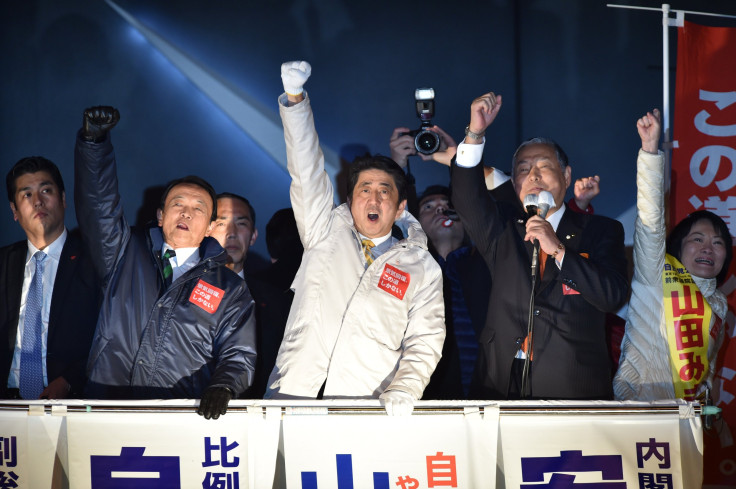Japan Election 2014: Voters Head To Polls, Expected To Return Shinzo Abe To Power, Despite Recession

Update as of 06:23 a.m. EST: Japanese Prime Minister Shinzo Abe's ruling coalition won a landslide victory in Sunday's election, according to exit polls cited by Reuters, and several other international media outlets.
Japanese broadcaster TBS projected that Abe's Liberal Democratic Party would win 294 seats while its junior partner, Komeito, would get 34, for a total of 328 seats out of 475 in the country's lower house, or Diet, according to AFP.
Abe had dubbed the vote a referendum on his reflationary economic policies, dubbed "Abenomics". Voters however, saw the election as less of a verdict on Abe's policies than an acquiescence to the ruling party's growing power, according to the Associated Press.
Original story below:
Japan's snap election Sunday is seen as a referendum on Prime Minister Shinzo Abe's economic reform policies, but the outcome could be more a rejection of the opposition than a vote of confidence in his policies. Abe called the snap election last month, just two years into his four-year term, in a bid to reaffirm his mandate ahead of some hard political decisions, including how to tackle Japan's faltering economy, which slipped into its third recession in four years during the summer.
Recent surveys indicate Abe's coalition government is likely to maintain its “super-majority” in the country's lower house, or Diet, despite a recent drop in the leader's popularity among voters, the BBC reported.
It's likely Abe's Liberal Democratic Party (LDP) will benefit from the fact the opposition fielded only 198 candidates for the 475 contested parliamentary seats, all but assuring a victory for the government, according to PBS.
Experts cautioned, however, a win for Abe may not represent a ringing endorsement of his policies as much as distrust of the country's main opposition party, the Democratic Party of Japan (DPJ).
"This is not so much a vote of confidence in Abe and the LDP as a vote of no-confidence in the political opposition," Columbia University Professor Gerry Curtis told Reuters.
The DPJ was in power from 2009 to 2012 but lost the electorate's confidence because it was perceived as inept, exemplified by running through three prime ministers in as many years and its handling of the aftermath of the 2011 tsunami that resulted in a nuclear meltdown at the plant in Fukushima, according to the Guardian.
Abe's government hiked the nation's sales tax from 5 percent to 8 percent in April, the first hike in 17 years. The country's economy has struggled to deal with the tax increase’s impact on demand, and many manufacturers are struggling with inventory, limiting the scope for increased production and growth.
With many voters apparently confused about why Abe called an election so early in his term, voter turnout could hit record lows, Channel NewsAsia reported.
In addition to the tough economic choices Abe will face if returned to power, thorny issues like restarting nuclear reactors taken offline after the Fukushima meltdown and a shift away from the country's postwar pacifist foreign policy, are likely factors in Abe seeking an enhanced mandate, according to Reuters.
© Copyright IBTimes 2024. All rights reserved.






















